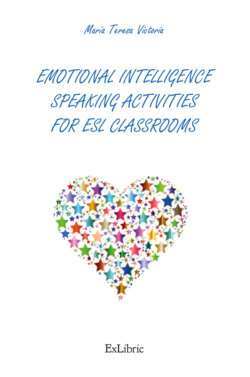Читать книгу Emotional intelligence speaking activities for ESL classrooms - María Teresa Victoria - Страница 9
На сайте Литреса книга снята с продажи.
ОглавлениеPrologue
I am very lucky to enjoy my work and also learn a lot from the people I work with. For more than ten years I have had the privilege of doing research and teaching at the University of Málaga Programa de Inteligencia Emocional Plena (PINEP - UMA). The Emotional Intelligence Program is developed by accredited professionals such as Natalia Ramos, Olivia Recondo or Liliana Salcido among others.
My most recent years have been enthusiastically devoted to working closely and intensely with hundreds of teachers at Teachers Training Centres (CEPs) and I can assure the vast majority of teachers are exceptional for the engagement, passion and dedication they put into their profession.
Their work does not end once their university studies have been completed, neither when they have achieved a permanent teaching position at Junta de Andalucía governmental schools nor even in their dedication in the classrooms on a daily basis. They actually believe in long-life learning, as a matter of fact, so their work goes beyond already demanding professions into further learning and training, always showing great desire to excel.
Out of love for what they do and how they do it, they want to self-develop and excel at transmitting knowledge, connecting with their students and cultivating their love for the profession itself. It is not otherwise understood that once their workday is over and after spending their personal time on preparing lessons, materials or countless proposals to connect more and better with their students, they dedicate even more time and effort to continue their training, expanding their knowledge and opening up to what innovative proposals CEPs may offer each year.
It was within this group of people who love their work for what it is and for what it can become that I met María Teresa Roura in 2018 when Emotional Intelligence and Mindfulness training courses were organised by Carmen Caparrós at the CEP Marbella-Coín. Ms Caparrós, to whom we are all appreciative for her professional, trustworthy and enthusiastic attitude, is also a great believer in the importance of Education in society.
During the CEP Marbella-Coín training, María Teresa was already showing signs of being wide open to working on something new. Above all, she seemed well prepared to getting personally involved in the training, which is fundamental when we talk about emotional work.
Just as no one can learn to ride a bicycle only by reading a manual, feeling our emotions and reading about emotions does not necessarily mean that we know how to manage them. Even more so in an efficient manner. María Teresa put all her effort into cultivating, experimenting, working both in a personal and professional level, and sharing what she had learned during the experiential training practice of the PINEP.
Needless to say, for the acquisition of emotional competences to really become more skilful they must travel from a merely cognitive field to a more experiential ground involving changes in those attitudes, habits and concepts that guided us in our personal and professional life before.
María Teresa took a step further wanting to excel for her own improvement and for the students with whom she worked on a daily basis, and we then had the pleasure of sharing time and knowledge yet again during the postgraduate studies in Mindfulness that were completed at the University of Málaga in 2020.
I supervised her final master’s work (TFM) when I could give record of all the great effort, dedication and love she showed during the acquisition of competences, resources and experiences, as well as her putting into practice new knowledge of emotional management and Mindfulness. This book along with her blog are the result of all those years of perseverance and dedication to such a rewarding discipline as Education.
Finally, I would like to say that sometimes out of routine, personal problems or other reasons, we forget that bonding is the most important when working with human beings. The effective management of emotions is undoubtedly linked to the acquisition of knowledge, skills and aptitudes in the field of Education in general and foreign language learning processes in particular. We currently live in a very demanding society where everything is expected instantly and sooner done than said. In this context, anxiety can become our students’ worst enemy, hence the importance that María Teresa Roura attributes to positive learning climates in the classroom with a sense of mutual respect, belonging and significance.
There are many resources and tools we can have at our disposal nowadays to improve our work as professionals but not so many, though, to improve personal competences. Namely the acquisition of emotional skills or an attitude of acceptance, trust or patience, which the practice of Mindfulness can develop.
This book can be a great resource to enrich the curriculum by adding to the most academic classes a breath of fresh air and gain momentum reminding ourselves of what first motivated us to devote our lives to Educational purposes. The varied proposals in this manuscript can be a great starting point to close bond with our students and provide tools that they might need in their day-to-day life.
Especially we would like to remind students that together with the acquisition of knowledge there are very fundamental things in life such as to raise awareness of our own interests whilst we recognise and defend also the interests of those who surround us.
Professor Oliver Jiménez. Psychologist.
(Málaga, Spain)
